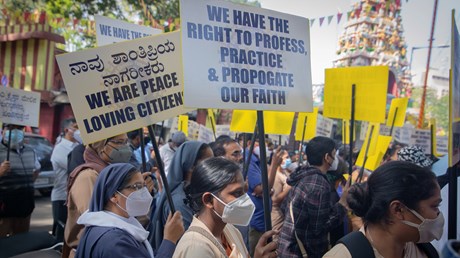The government didn’t have the votes to pass a controversial bill in Karnataka. So it found another way.

Last month, a delegation of Christian leaders met with Thawar Chand Gehlot, the governor of the southwest Indian state of Karnataka. Their aim: to discourage Gehlot from signing an anticonversion ordinance that they believe will embolden religious radicals to stir unrest.
Despite what Bengaluru archbishop Peter Machado described to CT as a “courteous and welcoming” reception, Gehlot signed the ordinance the following day, May 17, making Karnataka the 13th out of India’s 29 states to pass legislation of this kind.
The ordinance prohibits numerous behaviors including conversion by “force, undue influence, coercion, allurement or by any fraudulent means or by marriage,” and forbids anyone from helping or conspiring on conversions. It allows people beyond the convert—including family members, relatives, or even colleagues—to file complaints.
The ordinance also stipulates a jail term ranging from three to five years and a fine of 25,000 rupees (roughly $320). If the convert is a woman, child, or Dalit, the punishment can increase to up to 10 years in prison.
India’s first anticonversion law passed in the state of Madhya Pradesh in 1967. In recent years, as the Hindu nationalist Bhartiya Janta Party (BJP) has gained power across India, the party has begun to frequently promise these laws on the campaign trail.
But passing this legislation proved challenging in Karnataka, a state known widely by Westerners as the home of Bengaluru (Bangalore), a tech hub for many multinationals. Afraid that the majority party lacked the votes to pass an anticonversion bill, the governor directly promulgated it as an ordinance, or temporary law, that can remain in effect until it is replaced by a law.
“The ...
from Christianity Today Magazine
Umn ministry


.gif)

.gif)
.gif)
